As the son of a doctor I grew up with the sense that alternative healthcare was little more than hocus-pocus. But with my friends dropping terms like “zen,” “qi,” “yin” and “yang” into our conversations I decided it was time to move beyond my suspicion and take a look at holistic healthcare and some of the homos who deal in it.
Masina Wright, naturopath
My foray into holistic renewal began with naturopath Masina Wright of 360 Degrees Healthcare on King St E. At six feet tall, Wright impresses immediately as she explains her attraction to naturopathy. “I’m a humanitarian, not a scientist,” says Wright. “I’m not interested in research and my strength is in more of the whole person, sociology and human nature, not in heaps of chemistry and biology.”
She explains that naturopathic medicine is based on the belief that the body has an instinctive ability to heal and maintain itself, which may be assisted by various regimens and treatments such as homeopathy, colonics, relaxation and even, under certain circumstances, abstinence.
Wright, 35, says naturopathy differs from conventional medicine in that the assessment and treatment consider a patient’s entire body and lifestyle rather than isolating the pain that sparks a visit to the doctor. The process begins with a high-talk, low-touch assessment that Wright says can take up to two hours. “It’s about getting to know you,” she says.
After my assessment I am given a personal treatment plan that includes a variety of supplements and herbal remedies such as traumeel lotion, a homeopathic concoction, for lingering stiffness in my ankle resulting from a sprain in October. Wright also recommends I partake in high-protein snacks between meals, like a handful of almonds or boiled egg, to help balance the fluctuating blood sugar levels that provoke my all-you-can-eat cravings.
Wright is familiar with treating gay men whose main motivation for wellness is — like mine, admittedly — to look young, fit and energetic.
“I recall over brunch at Fire on the East Side, this fag sitting next to me telling his friend he’d pulled off three back-to-back nights out with a Myers’ cocktail and felt on top of the world” she says. Myers’ is a mix of vitamins normally taken intravenously by seriously ill patients that’s become a quick pick-me-up for party animals with alcohol- saturated livers.
“I’m not really into heroic medicine like that,” says Wright. “I think it’s a little extreme.”
Wright says the satisfaction she feels when a client’s treatment plan shows results confirms her choice to study naturopathy. The American trained in Vermont before moving to Toronto in 1995. She began practising naturopathic medicine, plugged into the unfamiliar queer scene and fell “terribly, terribly in love” with a family friend she longed for during her senior year.
These days Wright specializes in fertility. She says she feels a connection to other maternally minded dykes. “It’s a stronger sense of empathy toward lesbians looking to have a child,” she says. “It’s a mindfuck because you try to conceive and then have to wait two weeks to find out which, in our anxious and overcompulsive society, is really difficult.”
Her work mentoring at the Canadian College of Naturopathic Medicine on Sheppard Ave E allows Wright the chance to help shape future naturopaths – including ensuring they’re ready to deal with queer clients.
“I push the envelope,” she says. “I’m an out lesbian, I have tattoos and I think that’s good for students because they’re going to see queer people, trans people and people with different lifestyles and sexual habits. It’s good to get their levels of privilege challenged while they’re students.”
Susanda Yee, acupuncturist
Susanda Yee crashed her way into holistic health — literally. At age 22 Yee was a passenger in a car accident that sent her head into the windshield, causing whiplash. She was left with unbearable back pain and emotional trauma that led to fatigue and depression.
“In treatment I realized, ‘I have a health issue’,” says Yee. “I didn’t receive the care I needed and that injury lasted forever. Nowhere in my recovery was I asked, ‘How are you doing?’ It was only about the physical pain. The accident was traumatic and I was an emotional mess.”
Massage was among the few treatments that brought Yee physical relief and emotional reprieve, inspiring her to train as a massage therapist. Working with clients to gain some equilibrium of energy and blood flow within the body eventually sparked her interest in acupuncture.
As I recline in one of the weathered but comfy recliners in her practice on Spadina Ave, Yee crouches next to me and explains how inserting the tiny needles at various points on my body will help stimulate blood and energy flow within my body. “It’s going to help adjust the flow and unblock blocked energy,” she says, opening a package of sterilized needles.
Noting my squeamishness Yee directs me to take a deep breath and upon my exhalation, taps a needle lightly into the top of my foot through a narrow tube. Six deep breaths later seven needles stand out from my feet and wrists. Much to my surprise, the needles are flimsy and bend as I adjust my arms and legs.
“Get as comfortable as you need and I’ll be back in 40 minutes,” Yee says. Within minutes I can feel pressure in my left forearm, which we later surmise is the movement of energy in my less-often utilized arm. Other noticeable differences include a feeling of relaxation during the treatment and drowsiness afterward.
Adding to the treatment is the group setting in which Six Degrees Community Acupuncture specializes. “Moving the energy around like that while others are also affected enhances the experience,” says Yee in the room encircled with recliners. “Clients can have shorter treatments because it’s more intense.”
Yee notices that her queer clients are more likely to have experience with holistic health practices. “They’re more aware of what’s out there and they have tried acupuncture before, it’s not often a new thing,” she says. “They’re more open to experimentation and seeking more or different acupuncture treatment.”
Queer visitors to the clinic tend to recognize that acupuncture is not just beneficial for physical harmony, but also emotional and overall wellbeing, says Yee.
Yee, on the other hand, is rarely recognized as queer in the Chinese community. “When I tell someone I’m gay they’re surprised,” she says.
They’re polite but I can tell they’re put off a little bit because they don’t see me like that. There is openness but you have to look for it.”
Matt Sedo, shiatsu therapist
“Shiatsu is about using sustained pressure along key points and areas of tension or weakness on the body,” says Matt Sedo, while seemingly burrowing into the back of my neck while I lie face down. Short of breath and eyes popping, I take some relief that my face is concealed by the headrest, hoping to preserve some shred of manliness.
“Is that too much?” he asks, sensing my anguish. “Maybe a little,” I respond breathlessly as he eases the pressure. Apparently my denial of pain and mistaken perception of shiatsu as massage is common.
“Guys — gay and straight — are apprehensive to admit something’s off. We’re less sensitive to it than women,” Sedo says, reflecting on the past eight years performing treatments, “and shiatsu is distinct from massage which is more relaxing. Shiatsu is more energizing.”
It’s makes sense that Sedo’s work energizes others; the 32-year-old does not sit still naturally. Away from the clinic he cycles, rock climbs and takes yoga.
But he wasn’t always as active in terms of accepting his sexuality. “My creeping out experience took me a while because I just wasn’t cool with it,” Sedo says, looking back at his teens and early 20s. “I had a fixed notion of what gay was and that notion kept me from coming out.”
Today, Sedo believes his extended coming out experience – which culminated in his dad asking him point-blank if he was gay – helps him to better serve his diverse clientele. “It’s made me more accepting because I’ve had to be more accepting of myself and have a wider perspective on gender and orientation,” he says.
Sedo had his first shiatsu treatment while teaching English in Japan and felt an immediate connection. “I loved the grace of it and how it fostered body awareness — knowing where I hurt, acknowledging that and where I also felt good,” he says.
When he returned to Canada and settled in Toronto, drawn to the city’s diversity, Sedo studied at the Shiatsu School of Canada on College St. The graduate then apprenticed and worked at resorts and gyms practising shiatsu before going out on his own.
Sedo’s settlement in Toronto also led to a five-year relationship with filmmaker JP Kelly. “We were both screwing around separately with the same guy who was screwing around on his boyfriend unbeknownst to either of us,” Sedo says, smiling. “So he introduced the two of us and stopped seeing us both and then I found out JP lives one block away. A few days later, he just showed up and asked if I wanted to go for a drink.”
The offer is a familiar one for Sedo. His boyish good looks and piercing blue eyes, combined with the perceived intimacy of his work, have led many men to ask Sedo out during or following a treatment. “Touch evokes powerful emotions sometimes so it’s important that I maintain a professional rapport,” he says.
Jo-Anne Stevens, reiki practitioner
“Alright, you do your thing and I’ll do mine,” says Jo-Anne Stevens as my reiki treatment begins in the basement of her Burlington home, headquarters of her Essential Wellness Centre. “Her thing” begins by outstretching her arms, palms up, with her head turned upward and eyes closed.
In the relaxed state I’ve been asked to assume, mine are supposed to be closed too. After peeking to appease my momentary curiosity, I shut them again and rest while Stevens attempts to channel and uniformly redistribute energy throughout my body.
I don’t feel much during the treatment beyond her firm and steady touch on different parts of my body and a varying heartbeat, but Stevens cautions that sensations from a first treatment — physical or emotional — go largely unnoticed.
According to Stevens reiki requires some belief to fully benefit from the treatments. Reiki assumes all things have a vibration, the rate of which can be adjusted by, for example, a reiki practitioner. The practice follows principles similar to other types of holistic wellness. The five precepts — called “gokai” or “gakkai” — are: do not anger, do not worry, be thankful, work with diligence and be kind to others. “All others,” Stevens notes, adding that she commonly chats with the wasps that hover around the house she shares with partner Rita.
The two married four years ago in their backyard in bare feet — “to feel the universe’s energy more” — and Stevens, 56, credits her same-sex relationship as a benefit to her reiki lifestyle.
“There are many holistic practitioners who, on an intense learning path, can be very threatening to their partners,” says Stevens, who is bisexual. “In a hetero relationship that can make a man feel lost whereas a woman can give more leeway because she’s also like your very best friend so even if she’s not into it, she can accept it.”
While Stevens doesn’t advertise or make a point of disclosing her sexual orientation, she says she attracts lesbian clients “because they feel more comfortable with me.”
Her introduction to wellness in 1991 was powerful. “I just went kaput,” she says. “Chronic pain and accumulative stress just caught up with me and I crashed.”
Once she exhausted her employee assistance program benefits, the bank she worked at told her to go home and not return until she was better. During her respite Stevens discovered healthier eating and a wellness consumer show where she learned more about acupuncture and crystals, which she says are an important tool for her. “I have them on and around me all the time for maintenance,” she says. “They help nip things in the bud before they flare up.”
Stevens tells me that recurrent treatments can evoke stronger responses than simply the sense of relaxation I received from my intro to reiki. “I had one lady who began crying, then assumed the fetal position and then was totally bawling her eyes out,” says Stevens. “I told her to get it out of her system and she eventually calmed down. Another client had an out-of-body experience where she said she was standing at the back of the room and watched me, then got back in the moment.”
David Gellineau, yoga instructor
A fter an hour’s worth of postures and movements that stretch, strengthen and relax the body, yoga instructor David Gellineau has the dozen or so members of his class assume a pose that tweaks my homosexual instinct. Lying on our backs on the Downward Dog Studio’s second-floor classroom on Queen St E, Gellineau, in his steady chant-like tone, advises the class to lift their legs and pelvis, grab their heels and hold the pose. With my ass pointed toward the ceiling, I look around at the other classmates, feeling awkwardly exposed.
“Some of the poses can be sexual,” says Gellineau with a devilish smile after the class. “Everything you do on the mat is to enhance your life off the mat, including your sex life and sexuality. Everything is much better: your sexual drive, your breathing, your movements, everything.”
Gellineau, 39, first began yoga at age 27, not to boost his libido, but to alleviate his aching knees and hips from years of 40-minute morning runs.
“I liked the dance-like movements of it, almost a gymnastic feeling,” he says. “I think that’s appealing for gay individuals and it certainly appealed to me.”
Soon stretches on the yoga mat replaced strides on the asphalt altogether. His compact frame — five-foot three-inches and 130 pounds — quickly responded. “At first I was hopping around trying to find my balance but soon there was more stability and freedom as the postures realigned my body.”
Trips to India to study from the great masters of yoga become an annual routine and, after one retreat in 2003, Gellineau returned home, quit his counselling job in the city’s social services department and began instructing full time.
Today Gellineau embraces a yoga as a way of life. A typical day begins with practice at home or with fellow die-hards. Running the Beaches studio, private classes and meditation fill his time between a lunch hour and teaching evening classes. Mealtime foods take on shades of green and white; broccoli, spinach, chicken, turkey and egg whites are staples. Drinking and partying with his longtime partner are a rarity to ensure he regularly gets a full night’s sleep.
“My priorities have changed,” he says. “I can’t do the circuit parties and club scene like I did in my 20s and do he physical job that I do now.”
Gellineau feels his sacrifices for the sake of yoga aren’t as peculiar as they might have once seemed. These days a yoga mat slung over one’s shoulder is commonplace on the TTC and city streets as folks hustle to their class. Lululemon, the popular yoga wear label, is en vogue with both women and men at practice, work, play and elsewhere.
“Yoga is mainstream and has become acceptable,” says Gellineau. “People are commonly running, lifting weights and then stretching with yoga. It’s part of maintaining a healthy lifestyle.”
It’s also become an avenue for socializing and cruising. “There are a lot of queer guys who use this as a social network,” he says. “They’ll meet here and then go for coffee afterward — I mean green tea!”
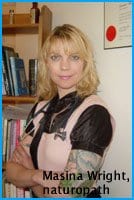
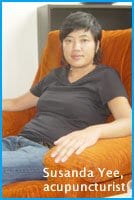
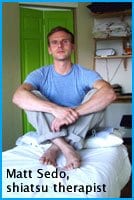
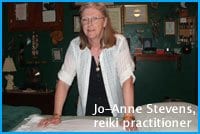
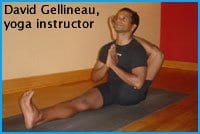
 Why you can trust Xtra
Why you can trust Xtra


